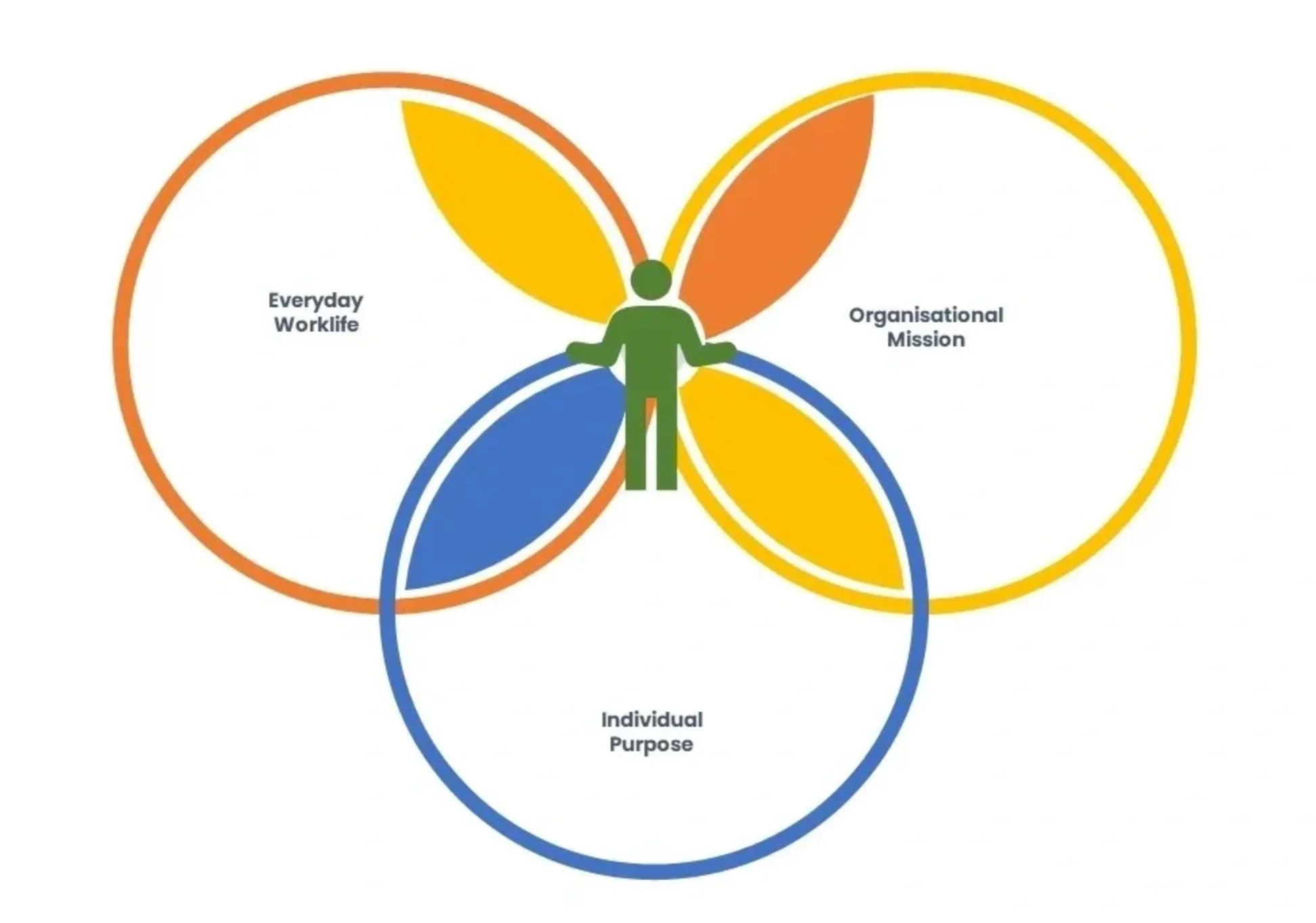Remind Me, Why Am I Here Again?
Finding the purpose mojo
When you hear the question “Remind me, why am I here again?”, where does your mind go immediately? Is it the meeting you were in this week where you were talked at by the most senior person in the room and your input and others was not sought?
Perhaps it goes to a recent experience where you were in business planning session, and you have a strong sense that the organisation is ignoring structural shifts in your marketplace.
Or does your mind connect it with where you are at with your career, your sense of fulfillment and contribution?
The fundamental thing at play here is Purpose.
Purpose is a concept that is often discussed in different settings consciously and unconsciously. It can be the subject of discussion between friends “I am unsure whether I am doing this for the right reasons”; between work colleagues “Why are we having these meetings, they feel pointless?!” and at an organisational level “What contribution and impact are we making beyond our own bottom line?”
In this piece, we will explore what purpose means at an individual level; the importance of purpose in the workplace on an everyday basis; and at an organisational level. We will explore how it influences behaviour and decision-making, and why it is crucial for personal fulfillment, making inroads on projects or issues, the success of businesses and institutions and the legacy it can create.
Tips on how to get purpose front and centre at an organisational, workday and personal level are also provided. Let’s start with why purpose is critical for any organisation, big or small.
Purpose in Organisations
Organisational purpose can be simply framed as to the reason for an organisation’s existence beyond profit-making. It encompasses the broader societal and ethical contributions that an organisation aims to achieve.
It is healthy for all organisations, no matter what their size, to do periodic check-ins on their purpose. By that I mean, seriously sitting back and ensuring that their Mission and Vision still resonates throughout all levels of the business. How can leaders conduct a meaningful check-in? Some suggested avenues are outlined below:
Employee Engagement: Interviewing and surveying staff to gauge how engaged and driven employees are in terms of working toward a greater cause. Testing the levels of motivation and satisfaction in their roles.
Customer and External Stakeholder Feedback: Interviewing or surveying existing customers or key stakeholders as to how aligned their own values and beliefs are with your organisation’s purpose.
Environmental Scan: Conducting a scan of the broader economic, social and environmental landscapes and their intersection with the work of the organisation is critical to ensure the organisation has its eyes on the horizon and not looking back over its shoulder, relying on how things used to be.
Executive Roundtable: Taking the data collected in the above and holding a workshop(s) that allows the Executive (and Board if applicable) to absorb the results of the above important feedback loops.
The results should beg the question So What? ... So what does this all mean for our organisation? Is our Mission and Vision still valid? Adjustments to the Mission and Vision will then trigger adjustments to direction, strategy and potentially further investment in the culture of the organisation. And by the way, purpose, strategy and culture are heavily interconnected.
Bringing a skilled external Facilitator into these discussions is invaluable. The Facilitator should ‘hold a mirror,’ create an environment for reflection, ensure all voices are heard, ask the questions that elicit different ways of thinking about the issue and generate new insights.
The Workplace on an Everyday Basis
I need to admit that when I crafted the question for this blog, my mind went to the ‘boring-repetitive-too many people in the room-comes around too quickly-meetings’ that have killed cumulative days no weeks of my life that I will never get back. I can almost guarantee that this is your lived experience as well.
So, if you are not the CEO of the organisation and / or are not in the driving seat to effect change in organisational purpose, your everyday work experience is where you can exert some level of control and influence and find greater purpose.
Dedicating time to concentrated work that will allow you to progress important projects or issues you need to research and make inroads on is challenging for many and nigh-on impossible for others when their calendar looks like a proverbial checkerboard of meetings.
Yet it is immersive work that often ignites a person’s sense of value-add, how their own motivations connect with the workplace and why they are willing to remain an employee. It provides a sense of purpose and belonging in the workplace.
By eradicating the ‘because we have always done it’ meetings can be liberating for the organisation and the individual, improving productivity, employee satisfaction and loyalty, because they are focused on purpose first-and-foremost.
Defining the purpose of meetings sounds easy but in practice can be difficult. We get so caught up on ‘having to have’ the weekly team catch-up, ‘having to have’ all the senior team come to a meeting with an external stakeholder just in case something comes up so it looks like you have all the bases covered.
I would often get the mental calculator out and guesstimate the cost of senior and executive meetings I would sit in and I would also think of the opportunity cost. And what I mean by the opportunity cost is what these experienced individuals could be working on instead that would make a difference for the organisation rather than being held captive to a well-meaning but misguided executive droning on and thinking that their views are singularly the only thing that matters.
So how can you ensure your everyday has greater purpose ….
Meeting Audit: Conduct an audit of the meetings that are recurring throughout the year. If you are the author of those meetings, ask WHY. If you are not the organiser, still ask WHY.
Ask what is the primary purpose of the meeting? Could the information that is shared in this forum be achieved through another mechanism? Do they need to be at this cadence? Importantly, do you need all the people on the invite list to attend each and every one of them? Can you give the gift of time back in people’s day and ensure they are kept in the loop again via another means.
Radical suggestion: I recently learnt through a podcast called “Work Life” by Adam Grant that Dropbox and Asana had their IT departments delete recurring meetings and staff could not reinstate those meetings for at least 48 hours (for Dropbox it was 2 weeks!). It is referred to as Meeting Doomsday. Staff were asked to genuinely consider the value of those meetings cancelled and challenged to consider them differently. Is this something your organisation would consider?
Meeting Reinvention: If you have answered the questions above and decided the meeting is important in driving organisational strategy, maintaining collaboration and connection for instance then well done.
Changing up how the meeting is structured is my next challenge to you. By shaking up how meetings are conducted it will help signal to those involved that the purpose is being refined, it will reinvigorate, inject a different energy and potentially generate new ways of thinking and working together.
How can you do this? A few suggestions are outlined below:
Turn the Agenda into Questions: Instead of pumping out the standard agenda, turn your agenda points into questions. What are the critical questions that need to be answered so the meeting is productive? This forces you back to being conscious of purpose.
Reduce the Time: If the meeting used to run for 1 hour for instance then do it in 30 minutes. This again ensures the discussion is focused and remains on task.
Location: Can this meeting be a walk and talk? If it is a mix of in person and on-line, ensure those online are invited to speak first. If it is in person, can a different meeting room be used that will help change the energy in the room, where people will sit etc.
Rotate the Chair: change the chairing of the meeting each time. This achieves a number of things, it helps everyone understand the importance (or possibly question the importance) of bringing people together, it provides newer or younger employees with experience and reduces the likelihood of the meetings becoming same-same.
No More than 7 rule: Keep the number of attendees to no more than seven people. They need to be key to the subject at hand. I promise you, anymore than seven people, the dialogue will be dominated by a few and you will be back to where you started. Everyone's voice matters.
If people feel slighted by not being invited, that again needs to be managed carefully so they are kept informed, they are recognised and made to feel valued in different ways. Changing mindsets that the number of meeting invites equates to importance will be a work in progress but one worth maintaining.
I do appreciate, that for some people, opening the calendar up and seeing a brick wall of meetings can make them feel important, that this in-itself is seemingly their purpose. Taking some of those meetings away will feel challenging and possibly exposing or threatening.
In all seriousness, managers should be alert to this with some of their team members as supportive conversations around their real value and where their expertise is required will be important so they can adjust the way they see themselves.
Conducting a meeting audit and reinventing the meeting format will contribute to you seeing where you are adding value, you will have the answer as to why having you attend is important and then it is up to you to step in, contribute, actively listen and in return have a higher level of satisfaction from your working day and ideally add to your Purpose bank account. You will also retrieve valuable work hours that can then be dedicated to those tasks that require deep and immersive thought.
Purpose at an Individual Level
For many people, having a purpose is a driving force that shapes their life, guides actions and for some, it can be considered part of their legacy.
I believe it is a natural thing for many of us to question what our purpose is throughout different stages of our life.
The questioning might be brought about for instance by finding yourself in an unrewarding job; not enjoying the line of study you have chosen to do at University; realising that the friends you have in your life are not aligned with your own set of values and beliefs; going through major milestones such as having a baby, hitting a round number birthday or losing someone close to you; witnessing others supposedly achieving great things and making a difference in their community and you yearning the same.
Individual purpose is, by its very nature, a very personal thing. It can be what drives a person to work in a certain sector, how they want to be when in the company of their family and close friends. At an individual level, it can be likened to a compass that provides direction, motivation and a sense of meaning in one’s life. Here are several aspects of individual purpose:
Identity and Self-Discovery: Purpose is closely linked to an individual's identity. It involves self-discovery, understanding one's values, passions, and strengths. It helps answer fundamental questions like, "Who am I?" "What do I want to accomplish?" “What type of work do I want to be involved in?” “Who do I want to be around?” “How can I be my best-self?”
Motivation and Drive: Having a clear sense of purpose fuels motivation and drive. It gives individuals a reason to get out of bed each morning, set goals and be focused on achieving them. Purpose can be a powerful antidote to procrastination and apathy.
Decision-making: Purpose plays a pivotal role in decision-making. It helps individuals prioritise choices that align with their values and long-term objectives. When faced with dilemmas, one can turn to their purpose as their north star.
Resilience: When individuals face challenges and setbacks, their sense of purpose can act as a resilience booster. It enables them to persevere through adversity, as they know their efforts are aligned with a higher goal.
Accomplishment and Well-Being: Individuals who live in alignment with their purpose often report higher levels of fulfillment and overall well-being. Purpose-driven individuals tend to experience lower levels of stress and are more content with their lives.
Legacy and Impact: Purpose extends beyond an individual's lifetime. It can be associated with the legacy one leaves behind. Many great leaders, artisans and community-makers are remembered for the impact they made through their sense of purpose.
As mentioned before, not having a sense of purpose, or finding yourself moving away from what was your driving force a few years ago for instance is a common feeling. In these moments, talking with a trusted confidante like a close friend or family member that can give you a different perspective is a healthy thing to do.
Another useful avenue is to find a Coach. Some coaches specialise in life coaching, others in careers, leadership, others in health and nutrition. The great value in pursuing this avenue is that this person will remain objective, they will act as your sounding board. The Coach will ask you questions that will allow you to gain deeper self-awareness and you will arrive at the answers that are innately right for you and you alone. Engaging in a coaching process helps you crystalise your sense of Purpose.
“Because this is where I’m meant to be”.
Be assured, it is possible that you can experience purpose alignment at an organisational, everyday workplace and individual level. The sweet spot in the Venn diagram where you can look around and say … "I know why I am here, where I make my best contributions and that I see myself in my organisation’s mission. "
Then the answer to the question “Why am I here again?” is simply “... because this is where I am meant to be”.





